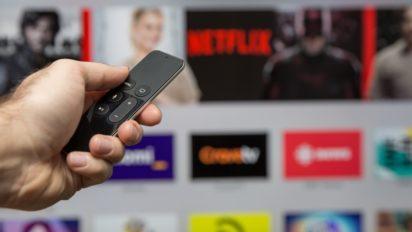
Will wintry weather affect your satellite internet or TV service? Possibly. Learn how to maintain your dish all season long.
Will wintry weather affect your satellite internet or TV service? Possibly. Learn how to maintain your dish all season long.
Tired of spending money on streaming services? Explore free alternatives for TV and movie streaming without breaking the bank.
Our guide to internet speed explains how to check your connection, what speeds you need for your tasks and how to improve Wi-Fi speeds.
Discover the essential tools and tips you need to start streaming TV. Learn about internet requirements, choosing the right devices and selecting streaming services to optimize your viewing experience!
The main difference between download speeds and upload speeds is the direction in which the data is traveling and how fast its getting there. There is, however, a bigger difference between what a good upload and download speed is.
If you’re an avid gamer, you need an internet connection that is fast, has low latency and is reliable enough to avoid network issues while you game at home or on the go. This guide highlights the best mobile hotspots for gaming devices, how they work, and ways to enhance your experience with one. Best […]
Thinking about your next move? Our experts break down the five best cities to live in the U.S. for high-speed internet and broadband availability.
The digital divide is the gap between individuals who have access to digital technology (phones, computers and the internet) and those who do not.
The digital divide of who has access to and can afford internet is closing slowly in the U.S. The latest Internet Use Survey by the National Telecommunications and Information Administration (NTIA) showed that 13 million more people used the internet in 2023 than in 2021. The people most affected by internet affordability and availability grew […]
Unsurprisingly, fast fiber connections are customers’ first choice for internet service. What’s interesting is that fiber providers are also customers’ choice for the best customer service experience. A new study by the American Customer Satisfaction Index (ACSI) found that fiber internet service providers (ISPs) topped non-fiber ISPs 76 to 68 (out of 100) for customer […]
How much is high-speed internet for the average customer? Here’s what you can expect to pay, how you can avoid overpaying and how you can cut monthly internet costs.
Whether you're gaming, streaming, schooling or working from home, learn everything you need to know to find the best internet speed for your needs.
If you’re traveling in an RV or camper, there are many internet options available like satellite internet, cellular networks and portable Wi-Fi hotspots. We discuss some of the best options for RV living.
The government set the minimum speed for 'fast' internet at 100 Mbps. Allconnect examines if that's fast enough and how the U.S. compares worldwide.
Fixing a 403 forbidden status code error is easier than you might think. Learn what a 403 error is, what causes it and how to fix it.
Cruise ship vacations can be exciting and exotic, but before you post your Jack and Rose selfie from the ship’s bow, ensure the cute photo won’t cost you a mint to share. You have several options for internet access on cruise ships at varying price points. We’ll walk you through how to access Wi-Fi before […]
Internet connections are not guaranteed, especially in a new subdivision or home build. Here’s what to look for and how to advocate for a connection.
A mobile hotspot can be a savior when you need internet on the go, but it's important to keep it secure.
Whether you find your own ISP or use your apartment’s internet, we’ll give you the run down on everything you need to know to get connected.
Moving soon? I share some firsthand tips and tricks for setting up internet service at a new home and share how that service is going years later.
We analyzed months of broadband data to determine the internet speeds Americans are actually getting compared to what's advertised.
Not sure what type of internet connection you are using at your home? We’ll show you how to find out what broadband you have.
504 vs 502 computer errors are confusing, so we help you understand what's happening when your web page won't load.
With millions of people cutting the cord to cable, streaming is bigger than ever. If you experience buffering while you stream, learn about ways to improve your streaming experience.
Government programs can provide funding and discounts on internet for households on Tribal lands, but many people don’t have access to internet at all.























